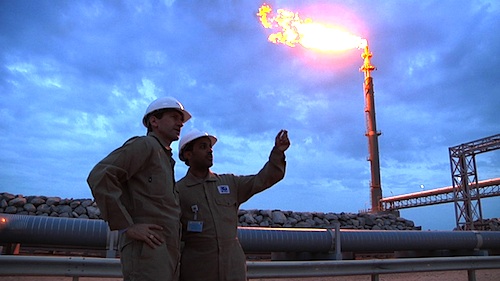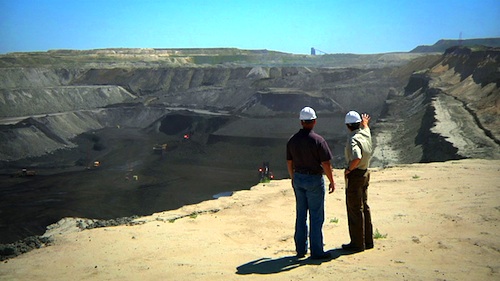
By Joe Bendel. Geologist Dr. Scott Tinker is serious about charting a rational energy policy for the future. You can tell this because he can envision a positive role for both nuclear power and hydraulic fracturing (a.k.a. fracking). Visiting diverse energy-producing sites around the globe, Dr. Tinker looks for a balanced menu of options to replace so-called “legacy” fuels in Harry Lynch’s documentary Switch (trailer here) , which opens in New York today.
It seems Dr. Tinker largely accepts the current terms of the global warming debate, but he never really belabors it in Switch. He just starts from the premise sending a lot of emissions into the atmosphere is generally a bad idea. Fair enough. However, he is level headed enough not to endorse anything along the lines of the Kyoto Protocols. According to Dr. Tinker, the West really is not going to be the problem in the future. At current rates, China and India will be releasing far more emissions than America and Europe combined—and they are not going to stop unless they determine it is in their economic interests.
He is also honest enough to admit the advantages of petroleum. This is not something the evil oil industry forced onto reluctant consumers – you can fill up your tank and drive for miles, yet it never leaves behind any soot or residue. That is why replacing it is quite the trick.
Lynch follows Tinker as he visits some remarkably photogenic power plants, but he never really finds any one panacea. Ocean and geothermal power are great if you happen to be in the perfect location, like Norway or Iceland, but not practical for a country the size of America, let alone China. Solar and wind can be nice supplements, but they are intermittent. Electric cars are cool, but they are still electric, which largely means more demand for coal.

Some unexpected dark horses emerge from the pack, like natural gas. Yes, it is a fossil fuel – but a remarkably clean burning one. Addressing the media scare campaign around hydraulic fracturing, Tinker’s experts flatly state there have never been documented cases of ground water contamination, arguing the greatest potential hazard would be spills at surface level. Of course, this is not risk-specific to fracturing, but applicable to just about every commercial endeavor.
Post-Fukushima nuclear power also factors into the mix. While the media focuses on Fukushima and Chernobyl, it has ignored France – where eighty percent of electricity is nuclear generated, without incident. As Tinker and his colleague crunch the numbers, it is hard to see how the world would wean itself from fossil fuels if nuclear is not part of the calculus.
Dr. Tinker is a smart and engaging presenter, who is undeniably far more knowledgeable about energy than the ideologues typically populating documentaries. Nonetheless, Switch gets a bit repetitive, showing scene after scene of Tinker touring big shiny installations, asking just what exactly does that valve-thingy do?
Be that as it may, Switch will definitely sharpen your thinking on energy. It offers a pretty comprehensive Cliff Notes for all forms of energy generation, scrupulously free of bias. While obviously part of a larger media campaign (just like Lee Hirsch’s Bully, a.k.a. The Bully Project, and a host of other theatrical docs), Switch will still reward open-minded viewers. Recommended for slightly wonky types, it opens today (9/21) in New York at the Landmark Sunshine.
LFM GRADE: B
September 21st, 2012 at 12:59pm.